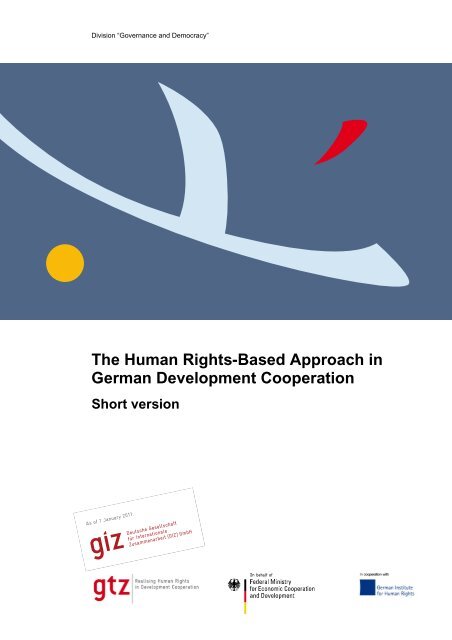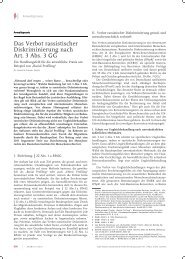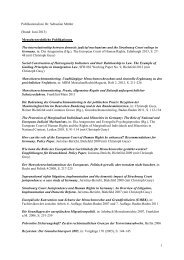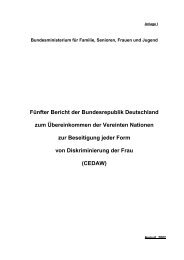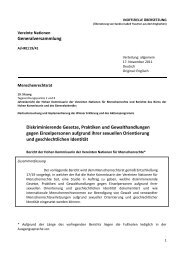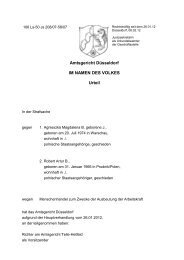The Human Rights-Based Approach in German Development ...
The Human Rights-Based Approach in German Development ...
The Human Rights-Based Approach in German Development ...
Create successful ePaper yourself
Turn your PDF publications into a flip-book with our unique Google optimized e-Paper software.
Division “Governance and Democracy”<br />
<strong>The</strong> <strong>Human</strong> <strong>Rights</strong>-<strong>Based</strong> <strong>Approach</strong> <strong>in</strong><br />
<strong>German</strong> <strong>Development</strong> Cooperation<br />
Short version
Published by:<br />
Deutsche Gesellschaft für<br />
Technische Zusammenarbeit (GTZ) GmbH<br />
Postfach 5180<br />
65726 Eschborn<br />
T +49 61 96 79-0<br />
F +49 61 96 79-11 15<br />
E <strong>in</strong>fo@gtz.de<br />
Internet:<br />
www.gtz.de<br />
Cross sectoral project:<br />
Realis<strong>in</strong>g <strong>Human</strong> <strong>Rights</strong> <strong>in</strong> <strong>Development</strong> Cooperation<br />
Authors:<br />
Juliane Osterhaus, Folke Kayser<br />
Responsible:<br />
Jörg-Werner Haas<br />
Contact person at the Federal M<strong>in</strong>istry for<br />
Economic Cooperation and <strong>Development</strong> (BMZ):<br />
Anke Oppermann<br />
Layout:<br />
Olaleye<br />
Eschborn, July 2009
<strong>The</strong> <strong>Human</strong> <strong>Rights</strong>-<strong>Based</strong> <strong>Approach</strong><br />
<strong>in</strong> <strong>German</strong> <strong>Development</strong> Cooperation (Short version)<br />
What is the <strong>Human</strong> <strong>Rights</strong>-<strong>Based</strong> <strong>Approach</strong> (HRBA)?<br />
<strong>The</strong> HRBA is a conceptual framework that is normatively based on <strong>in</strong>ternational<br />
human rights standards and operationally directed to promot<strong>in</strong>g and protect<strong>in</strong>g<br />
human rights. An HRBA <strong>in</strong>tegrates the norms, standards and pr<strong>in</strong>ciples of<br />
<strong>in</strong>ternational human rights law <strong>in</strong>to the plans, policies and processes of<br />
development.<br />
Both the Federal Republic of <strong>German</strong>y and the partner countries have ratified the<br />
major human rights treaties and are thus obliged to implement them. <strong>The</strong> l<strong>in</strong>k<br />
between human rights and development has been re<strong>in</strong>forced by the UN<br />
Millennium Declaration from 2000. With the declaration, the <strong>in</strong>ternational<br />
community has committed to reduce poverty through the fulfilment of all human<br />
rights for all people. In l<strong>in</strong>e with this commitment, the <strong>German</strong> Federal M<strong>in</strong>istry for<br />
Economic Cooperation and <strong>Development</strong> (BMZ) adopted the first <strong>Development</strong><br />
Policy Action Plan on <strong>Human</strong> <strong>Rights</strong> <strong>in</strong> 2004, and its cont<strong>in</strong>uation <strong>in</strong> March 2008.<br />
This plan requires all <strong>German</strong> governmental development agencies to apply an<br />
HRBA across all sectors and levels of <strong>in</strong>tervention.<br />
What does the HRBA offer to development cooperation?<br />
An HRBA helps to deliver equitable and susta<strong>in</strong>able development results. It l<strong>in</strong>ks<br />
development efforts <strong>in</strong> all areas of work to universal and legally b<strong>in</strong>d<strong>in</strong>g human<br />
rights standards. This enhances legitimacy of pro-poor and equity-oriented<br />
development cooperation and creates an added lever <strong>in</strong> policy dialogue. It<br />
supports aid effectiveness by provid<strong>in</strong>g an agreed platform of objectives and<br />
norms shared by donors and partner countries alike, on which to build<br />
development processes.<br />
An HRBA provides tools for understand<strong>in</strong>g and address<strong>in</strong>g the multi-dimensional<br />
root causes of poverty and violent conflict, <strong>in</strong>clud<strong>in</strong>g discrim<strong>in</strong>ation,<br />
powerlessness, lack of political participation and lack of access to basic<br />
resources and services. It ensures that development addresses the most
<strong>The</strong> <strong>Human</strong> <strong>Rights</strong>-<strong>Based</strong> <strong>Approach</strong><br />
<strong>in</strong> <strong>German</strong> <strong>Development</strong> Cooperation (Short version)<br />
vulnerable by focus<strong>in</strong>g on the promotion of the rights of women and marg<strong>in</strong>alised<br />
groups, <strong>in</strong>clud<strong>in</strong>g, children, ethnic m<strong>in</strong>orities, migrants and people with<br />
disabilities. It thus complements and re<strong>in</strong>forces other development agendas such<br />
as poverty reduction, gender equality, crisis prevention, good governance and<br />
susta<strong>in</strong>able development.<br />
An HRBA supports strategic management of development cooperation by<br />
def<strong>in</strong><strong>in</strong>g m<strong>in</strong>imum standards which help to def<strong>in</strong>e development priorities and<br />
provide a basis for equitable resource allocation.<br />
<strong>The</strong> n<strong>in</strong>e core UN human rights treaties with year of adoption<br />
International Covenant on Civil<br />
and Political <strong>Rights</strong> (ICCPR), 1966<br />
International Covenant on Economic,<br />
Social and Cultural <strong>Rights</strong> (ICESCR), 1966<br />
International Convention on the Elim<strong>in</strong>ation<br />
of All Forms of Racial Discrim<strong>in</strong>ation (ICERD), 1965<br />
Convention on the Elim<strong>in</strong>ation of All Forms<br />
of Discrim<strong>in</strong>ation Aga<strong>in</strong>st Women (CEDAW), 1979<br />
Convention aga<strong>in</strong>st Torture and Other Cruel, Inhuman or<br />
Degrad<strong>in</strong>g Treatment or Punishment (CAT), 1984<br />
Ratifications<br />
164<br />
Convention on the <strong>Rights</strong> of the Child (CRC), 1989 193<br />
International Convention on the Protection of the <strong>Rights</strong> of All<br />
40<br />
Migrant Workers and Members of <strong>The</strong>ir Families (ICRMW), 1990<br />
Convention on the <strong>Rights</strong> of Persons with Disabilities (CRPD),<br />
50<br />
2006<br />
International Convention for the Protection of All Persons from<br />
9<br />
Enforced Disappearance (ICPED), 2006 (not yet <strong>in</strong> force)<br />
160<br />
173<br />
185<br />
146<br />
Source: Office of the UN High Commissioner for <strong>Human</strong> <strong>Rights</strong> http://www.ohchr.org,<br />
ratifications as of 1 March 2009<br />
What are human rights?<br />
<strong>Human</strong> rights are the civil, political, economic, social and cultural rights codified <strong>in</strong><br />
<strong>in</strong>ternational human rights treaties. <strong>The</strong>y def<strong>in</strong>e what humans need for a life <strong>in</strong>
<strong>The</strong> <strong>Human</strong> <strong>Rights</strong>-<strong>Based</strong> <strong>Approach</strong><br />
<strong>in</strong> <strong>German</strong> <strong>Development</strong> Cooperation (Short version)<br />
dignity and freedom. Today, all UN member states have ratified at least one of<br />
the follow<strong>in</strong>g n<strong>in</strong>e core <strong>in</strong>ternational human rights treaties, and 80% have ratified<br />
four or more (See box above).<br />
<strong>Human</strong> rights are:<br />
• Universal – they belong to all people.<br />
• Indivisible – there is no hierarchy between different rights.<br />
• Interdependent – the improvement of one right facilitates advancement of the<br />
others. For example, fulfilment of the right to education enables people to use<br />
their rights to political participation and to freedom of op<strong>in</strong>ion.<br />
States assume obligations under <strong>in</strong>ternational law to respect, protect and fulfil<br />
human rights:<br />
• <strong>The</strong> obligation to respect requires that states refra<strong>in</strong> from directly or <strong>in</strong>directly<br />
<strong>in</strong>terfer<strong>in</strong>g with the enjoyment of human rights.<br />
• <strong>The</strong> obligation to protect means that states must prevent third parties (e.g.<br />
<strong>in</strong>dividuals or companies) from <strong>in</strong>terfer<strong>in</strong>g, directly or <strong>in</strong>directly, with the<br />
enjoyment of human rights. For example, states should enact legislation that<br />
prevents employers from discrim<strong>in</strong>at<strong>in</strong>g on grounds of gender.<br />
• <strong>The</strong> obligation to fulfil obliges states to adopt legislative, adm<strong>in</strong>istrative,<br />
budgetary, judicial and other necessary measures to achieve the full<br />
realisation of human rights.<br />
Some human rights have to be fulfilled immediately, such as the right to non<br />
discrim<strong>in</strong>ation. Others, such as the right to education or social security, may be<br />
achieved progressively, tak<strong>in</strong>g <strong>in</strong>to account exist<strong>in</strong>g resource constra<strong>in</strong>ts.<br />
Progressive realisation requires concrete, measured, time bound action towards<br />
full realisation of all rights.
<strong>The</strong> <strong>Human</strong> <strong>Rights</strong>-<strong>Based</strong> <strong>Approach</strong><br />
<strong>in</strong> <strong>German</strong> <strong>Development</strong> Cooperation (Short version)<br />
Frequent misunderstand<strong>in</strong>gs<br />
False<br />
<strong>The</strong> HRBA is only relevant to the good<br />
governance agenda.<br />
Realis<strong>in</strong>g economic, social and cultural<br />
rights means that provision of services like<br />
water, health care and education must not<br />
be privatised and that these services need<br />
to be provided cost-free.<br />
Economic, social and cultural rights are<br />
mean<strong>in</strong>gless because they are nonjusticiable.<br />
True<br />
<strong>The</strong> <strong>in</strong>divisibility of human rights means<br />
that human rights encompass economic,<br />
social and cultural rights as well as civil<br />
and political rights. Consequently, the<br />
HRBA applies to all sectors of<br />
development cooperation <strong>in</strong>clud<strong>in</strong>g, for<br />
example, water and sanitation, health<br />
care and food security.<br />
<strong>Human</strong> rights law leaves it to the state<br />
how to organise the provision of these<br />
services, <strong>in</strong>clud<strong>in</strong>g through private<br />
service providers. However, the state as<br />
the primary duty-bearer has to regulate to<br />
assure compliance with human rights<br />
provisions such as non-discrim<strong>in</strong>ation,<br />
universal access, acceptable quality etc.<br />
Fees can be charged but must be<br />
affordable to avoid de facto exclusion.<br />
Primary education should always be free<br />
of charge.<br />
Although litigation can be costly and<br />
complex, there is an <strong>in</strong>creas<strong>in</strong>g number<br />
of cases <strong>in</strong> which court action has led to<br />
substantial changes <strong>in</strong> the allocation of<br />
public resources and the concrete<br />
realisation of economic, social and<br />
cultural rights.<br />
What does the HRBA mean <strong>in</strong> practice?<br />
<strong>The</strong> m<strong>in</strong>imum requirement of an HRBA <strong>in</strong> practice is that development<br />
cooperation does no harm to the human rights of any population. <strong>Human</strong> rights<br />
should also be <strong>in</strong>tegrated across all sectors and at all stages of the programme<br />
cycle through<br />
• Capacity development of both right-holders to claim their rights and dutybearers<br />
to fulfil their obligations.
<strong>The</strong> <strong>Human</strong> <strong>Rights</strong>-<strong>Based</strong> <strong>Approach</strong><br />
<strong>in</strong> <strong>German</strong> <strong>Development</strong> Cooperation (Short version)<br />
• Systematic orientation towards human rights standards and reference<br />
documents.<br />
• Adherence to and promotion of human rights pr<strong>in</strong>ciples: Non-discrim<strong>in</strong>ation<br />
and equality, participation and empowerment, and transparency and<br />
accountability.<br />
Furthermore, a HRBA requires support for specific human rights projects and<br />
programmes, such as <strong>in</strong>itiatives that address human rights violations affect<strong>in</strong>g<br />
particular groups.<br />
Work<strong>in</strong>g with right-holders and duty-bearers<br />
<strong>The</strong> HRBA works from both the 'demand' and the 'supply' side of rights, because<br />
the fulfilment of rights depends upon the meet<strong>in</strong>g of obligations.<br />
Supply-side capacity requires support to partner countries to translate human<br />
rights standards and pr<strong>in</strong>ciples <strong>in</strong>to national law, policies and practice. Actions<br />
<strong>in</strong>clude support to governmental <strong>in</strong>stitutions to:<br />
• Create the necessary conditions and space for mean<strong>in</strong>gful and broad<br />
stakeholder participation <strong>in</strong> relevant processes at micro, meso and macro<br />
level.<br />
• Establish compla<strong>in</strong>t and redress mechanisms rang<strong>in</strong>g from health watch<br />
committees <strong>in</strong> local cl<strong>in</strong>ics to measures to improve the <strong>in</strong>dependence and<br />
effectiveness of national courts.<br />
• Undertake situation analysis of human rights and discrim<strong>in</strong>ation and translate<br />
human rights standards <strong>in</strong>to concrete entitlements to services and<br />
appropriate budget allocations.<br />
Demand-side capacity requires support right-holders to claim and realise their<br />
rights through human rights education, awareness, monitor<strong>in</strong>g and action.<br />
Actions <strong>in</strong>clude:<br />
• Enabl<strong>in</strong>g <strong>in</strong>dividuals and groups to claim their rights <strong>in</strong> court through litigation.<br />
• Support<strong>in</strong>g civil society monitor<strong>in</strong>g of public policies, budgets and services.
<strong>The</strong> <strong>Human</strong> <strong>Rights</strong>-<strong>Based</strong> <strong>Approach</strong><br />
<strong>in</strong> <strong>German</strong> <strong>Development</strong> Cooperation (Short version)<br />
• Develop<strong>in</strong>g organisational capacities so that groups are better equipped to<br />
mobilise, gather <strong>in</strong>formation and undertake advocacy campaigns.<br />
Figure 1: Model of the human rights-based approach<br />
Us<strong>in</strong>g human rights standards and reference documents<br />
<strong>The</strong> HRBA means that the <strong>in</strong>ternational human rights framework should guide<br />
our <strong>in</strong>terventions. In addition to the n<strong>in</strong>e core treaties, other human rights are<br />
codified <strong>in</strong> the regional human treaties, such as the European Convention on<br />
<strong>Human</strong> <strong>Rights</strong> (1950), the American Convention on <strong>Human</strong> <strong>Rights</strong> (1969), and<br />
the African Charter on <strong>Human</strong> and Peoples’ <strong>Rights</strong> (1981). Other <strong>in</strong>ternational<br />
<strong>in</strong>struments conta<strong>in</strong><strong>in</strong>g human rights <strong>in</strong>clude the labour conventions of the<br />
International Labour Organization (ILO).<br />
<strong>Human</strong> rights reference documents, which provide <strong>in</strong>formation relevant for<br />
development cooperation, <strong>in</strong>clude:<br />
• General Comments issued by the UN treaty bodies <strong>in</strong>terpret human rights<br />
standards and make them operational for development cooperation. <strong>The</strong><br />
General Comments issued by the UN Committee on Economic, Social and
<strong>The</strong> <strong>Human</strong> <strong>Rights</strong>-<strong>Based</strong> <strong>Approach</strong><br />
<strong>in</strong> <strong>German</strong> <strong>Development</strong> Cooperation (Short version)<br />
Cultural <strong>Rights</strong> outl<strong>in</strong>e the core elements of the rights enshr<strong>in</strong>ed <strong>in</strong> the<br />
Covenant such as the right to hous<strong>in</strong>g, food, or education. For example, the<br />
core elements of the right to the highest atta<strong>in</strong>able standard of health <strong>in</strong>cludes<br />
that basic health care services must be available, accessible, acceptable and<br />
of sufficient quality.<br />
• <strong>Human</strong> rights monitor<strong>in</strong>g <strong>in</strong>formation: Ratify<strong>in</strong>g states need to submit<br />
regular reports to the UN treaty bodies, who publish Conclud<strong>in</strong>g Observations<br />
on states' progress. Civil society organisations can submit complementary<br />
parallel reports. In addition, states undergo exam<strong>in</strong>ations under the Universal<br />
Periodic Review (UPR) mechanism of the <strong>Human</strong> <strong>Rights</strong> Council.<br />
• Reports by UN Special Rapporteurs on specific human rights topics serve<br />
to clarify human rights standards. For example, the UN Special Rapporteur<br />
on the right to health devised human rights <strong>in</strong>dicators for monitor<strong>in</strong>g child<br />
mortality.<br />
• Statistical <strong>in</strong>formation: <strong>The</strong> Office of the UN High Commissioner for <strong>Human</strong><br />
<strong>Rights</strong> has developed human rights <strong>in</strong>dicators for the realisation of selected<br />
human rights at structural, process and outcome level.<br />
• Jurisprudence <strong>in</strong> response to <strong>in</strong>dividual compla<strong>in</strong>ts by the UN treaty bodies,<br />
regional human rights courts, and national courts.<br />
• In addition, various UN bodies and agencies have produced guidel<strong>in</strong>es,<br />
toolkits, and fact sheets that provide further guidance on human rights issues.<br />
<strong>The</strong> extent to which an explicit reference to human rights can be made <strong>in</strong> policy<br />
dialogue will vary from country to country, depend<strong>in</strong>g on the political context.<br />
However, even <strong>in</strong> countries where it is more difficult to talk about human rights<br />
explicitly, human rights standards and pr<strong>in</strong>ciples can be used implicitly as a basis<br />
for practical work through def<strong>in</strong><strong>in</strong>g objectives, <strong>in</strong>dicators and strategies (see<br />
Further Read<strong>in</strong>g)
<strong>The</strong> <strong>Human</strong> <strong>Rights</strong>-<strong>Based</strong> <strong>Approach</strong><br />
<strong>in</strong> <strong>German</strong> <strong>Development</strong> Cooperation (Short version)<br />
Promot<strong>in</strong>g human rights pr<strong>in</strong>ciples<br />
<strong>The</strong> HRBA recognises that the process of achiev<strong>in</strong>g results is as important as<br />
outcomes. <strong>The</strong> HRBA therefore requires promotion of the follow<strong>in</strong>g human rights<br />
pr<strong>in</strong>ciples <strong>in</strong> all development processes:<br />
Non-discrim<strong>in</strong>ation and equality requires states to respect, protect and fulfil the<br />
rights of all, regardless of their orig<strong>in</strong>, age, sex, mental or physical health, ethnic<br />
or religious affiliation, or any other status. Government and development<br />
cooperation resources must be used <strong>in</strong> ways that reduce discrim<strong>in</strong>ation and<br />
improve equal access to all essential services and resources. This may require<br />
time-bound measures, such as quotas or subsidies that favour a discrim<strong>in</strong>ated<br />
group of people. It also requires support for the collection and use of data<br />
disaggregated by sex and any other relevant social categories such as ethnicity,<br />
age or socio-economic status.<br />
Participation and empowerment requires a shift from consultation and<br />
engagement of relevant stakeholders <strong>in</strong> the programme cycle to strengthen<strong>in</strong>g<br />
and deepen<strong>in</strong>g civic and political participation. <strong>The</strong> HRBA supports structures,<br />
<strong>in</strong>stitutions, policies and legal frameworks that susta<strong>in</strong>ably widen spaces for<br />
participation and democratic engagement. It enables relevant groups, <strong>in</strong>clud<strong>in</strong>g<br />
the most marg<strong>in</strong>alised, to participate <strong>in</strong> decision-mak<strong>in</strong>g processes at local,<br />
regional and national level <strong>in</strong> a mean<strong>in</strong>gful way.<br />
Accountability and transparency requires support for <strong>in</strong>clusive and participatory<br />
monitor<strong>in</strong>g, adequate accountability mechanisms and remedies. Accountability<br />
mechanisms are fora of explanation and justification. <strong>The</strong> HRBA supports<br />
engagement with, and strengthen<strong>in</strong>g of, a range of formal and <strong>in</strong>formal<br />
accountability mechanisms:<br />
• Judicial e.g. judicial review of executive acts and omissions, constitutional<br />
redress, public <strong>in</strong>terest litigation;<br />
• Quasi-judicial e.g. national human rights <strong>in</strong>stitutions, regional and<br />
<strong>in</strong>ternational human rights treaty bodies;
<strong>The</strong> <strong>Human</strong> <strong>Rights</strong>-<strong>Based</strong> <strong>Approach</strong><br />
<strong>in</strong> <strong>German</strong> <strong>Development</strong> Cooperation (Short version)<br />
• Adm<strong>in</strong>istrative e.g. opposition proceed<strong>in</strong>gs, compla<strong>in</strong>ts desks at public<br />
services, ombudspersons;<br />
• Political e.g. parliamentary committees, elected health or education councils;<br />
and<br />
• Social e.g. the <strong>in</strong>volvement of civil society <strong>in</strong> policy or budget monitor<strong>in</strong>g,<br />
public hear<strong>in</strong>gs, social audits.<br />
Further read<strong>in</strong>g<br />
BMZ (2008), <strong>Development</strong> Policy Action Plan on <strong>Human</strong> <strong>Rights</strong>, Bonn.<br />
http://www.bmz.de/en/service/<strong>in</strong>fothek/fach/konzepte/konzept167.pdf<br />
BMZ (2008) Apply<strong>in</strong>g human rights <strong>in</strong> practice – Fact Sheets on a human<br />
rights-based approach <strong>in</strong> development cooperation (for all priority sectors),<br />
BMZ Topics 194, Bonn:<br />
http://www.bmz.de/en/service/<strong>in</strong>fothek/fach/materialien/Materialie195.pdf<br />
GTZ (2009), <strong>The</strong> ABC of <strong>Human</strong> <strong>Rights</strong> for <strong>Development</strong> Cooperation,<br />
Eschborn. http://www.gtz.de/de/dokumente/en-abc-2009-02.pdf<br />
OECD/DAC (2007), DAC Action-Oriented Policy Paper on <strong>Human</strong> <strong>Rights</strong> and<br />
<strong>Development</strong>, Paris. http://www.oecd.org/dataoecd/15/12/38713028.pdf<br />
Office of the UN High Commissioner for <strong>Human</strong> <strong>Rights</strong> (OHCHR) (2006),<br />
Frequently asked questions on a human rights-based approach to<br />
development cooperation, Geneva.<br />
http://www.ohchr.org/Documents/Publications/FAQen.pdf<br />
OHCHR (2008), Claim<strong>in</strong>g the MDGs: A human rights approach, Geneva<br />
http://www2.ohchr.org/SPdocs/Claim<strong>in</strong>g_MDGs_en.pdf<br />
Website of the OHCHR http://www.ohchr.org: texts of human rights<br />
conventions, ratifications, general comments, conclud<strong>in</strong>g observations and<br />
other treaty-body related documents.
Deutsche Gesellschaft für<br />
Technische Zusammenarbeit (GTZ) GmbH<br />
Dag-Hammarskjöld-Weg 1-5<br />
65760 Eschborn/<strong>German</strong>y<br />
T +49 61 96 79-0<br />
F +49 61 96 79-11 15<br />
E <strong>in</strong>fo@gtz.de<br />
I www.gtz.de


